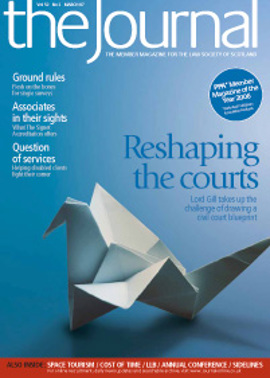Flagging up VAT

Every corporate deal has VAT issues. However, VAT is a concern that is often overlooked by advisers. A failure to address the VAT issues pertinent to a deal promptly, can result, at best, in an additional complication when the deal is closing, and at worst in a significant cost for the client. It is perhaps reasonable for the legal profession to assume that the VAT issues are being handled by the accountant involved in the deal. However, the lawyer will add value to his or her service by flagging up the VAT issues early on.
Anyone who knows anything about VAT appreciates that it is a complicated subject, but a detailed knowledge of VAT legislation and practice is not necessary in order to provide clients with a high quality service. What is required is a knowledge of broadly where VAT risks arise and where help can be obtained.
Examples of corporate deals and their VAT issues are set out below. In considering these, it should also be borne in mind that certain business sectors have their own specific VAT complications, for instance the hotel trade, financial services, charities, the property industry and education. It is beyond the scope of this article to discuss any one sector in depth. It is strongly recommended that a VAT specialist be asked to advise in any deal arising in a VAT-sensitive industry such as any of those mentioned.
Questions to watch
Examples of the type of VAT issues that arise in typical corporate deals include:
- Is this a sale of assets or a transfer of a business as a going concern?
- If a sale of assets, is VAT chargeable on the sale?
- Is the VAT charged on the professional costs associated with the deal recoverable by the relevant party?
- Does the transaction result in the need for any new VAT registrations or VAT groupings?
- If there are properties involved in a deal, have any been opted to tax?
- If not, should options to tax be made?
These examples will be expanded on in more detail below – with a view to outlining the sorts of issues that should be watched out for, rather than providing a definitive guide to the VAT treatment of specific transactions.
Some typical corporate deals
Purchase or sale of a business
From a VAT point of view, the sale (or purchase) of a business is treated in one of two ways. The transaction is either a transfer of a business as a going concern (“TOGC” more commonly) and therefore outside the scope of VAT, or it is a sale of business assets. The VAT treatment is quite different depending which treatment applies, and the correct treatment is a question of fact.
The sale of a business as a TOGC is outside the scope of VAT. In order to qualify as a TOGC, certain conditions must be met. These are set out in HM Revenue and Customs’ Notice 700/9/02 at para 2.3. If the sale of a business does not meet any one of these conditions, the sale will be one of assets and whether VAT is charged will depend on the nature of each of the assets being sold.
Advisers to a purchaser of a business who is unable to recover VAT charged on the sale should be alert to the possibility of the deal being structured as a TOGC in order to minimise VAT costs for their client.
Where the sale of a business includes property, particular attention should be paid to the VAT status of the property. By default, sales of land and property are exempt from VAT. However, there are a number of exceptions to this rule such that certain property sales are taxable at the standard rate and some at the zero rate. Certain properties that would otherwise be exempt from VAT become taxable at the standard rate if the owner has opted to tax his interest in the property. Where a sale of a business includes the sale of a property that has been opted to tax by the seller, and the sale qualifies as a TOGC, in order for the sale of the property as part of the total transaction to be outside the scope of VAT it is necessary for the purchaser to have opted to tax the property himself, on or before the change of ownership.
In addition, for any property being purchased as part of a TOGC where the property is a Capital Goods Scheme (CGS) item, the seller must pass the CGS history to the new owner. The CGS is (another!) complicated piece of VAT legislation that applies to certain high value capital expenditure. Look out for this where any property (including a refurbishment) has been purchased within the past 10 years, the cost exceeded £250,000 (excluding VAT), and VAT was suffered on the purchase price. The CGS may also apply to a straightforward purchase of business assets which include a property acquired for a price in excess of £250,000. The CGS rules may be found in Customs Notice 706/2/02 but again, specialist advice is recommended when the rules apply.
The above points are only some examples of the VAT issues to be considered when a business changes hands. It is clear from these that VAT can be a complication that should be addressed early on.
Establishing a new businessThe most obvious point to be considered when a new business is being set up is whether or not it should be registered for VAT.
A business is only eligible to be registered for VAT if it makes taxable supplies (this includes all supplies made at the standard rate, the reduced rate or the zero rate), and therefore a business that makes only exempt supplies may not register at all. Again, the question of what supplies are taxable or exempt is outwith the scope of this article. However as a rule of thumb, all supplies are taxable at the standard rate unless they are listed in the legislation as exempt, zero-rated or reduced-rated. These exceptions are listed in the VAT Act 1994, schedules 9, 8 and 7A respectively.
Any level of taxable supplies entitles the supplier to register for VAT, but when either of the registration thresholds have been crossed (the more commonly applied one being £61,000 of taxable supplies on a rolling basis over the past 12 months) the supplier must register within statutory time limits. Thus it is necessary to consider whether the thresholds have been crossed on a monthly basis. The structure of the new business should also be considered. For instance, where a business is being operated by a sole trader, that person’s other business interests (if any) must be considered with respect to VAT registration. A partnership VAT registration requires a different administrative process; a registration involving a number of related companies may require a VAT group to be set up.
Building of new property or conversion of old property for onward sale
The VAT treatment of construction costs can be standard, reduced or zero-rated, depending on the nature of the project. The supplier of these services is responsible for getting the VAT treatment right, but won’t always do so! Whether any VAT on such services is recoverable by the party to whom the services have been supplied, depends on what he intends to do with the property. VAT can be a real cost in property development schemes, therefore should be an agenda item early on in the planning phase.
The above examples are a few of many of the types of deals that the legal profession sees regularly. But as indicated above, it is not just the type of transaction that triggers VAT complications, it is also the nature of the client’s business.
Industry issues
Any business that makes both taxable and exempt supplies is partially exempt and, assuming it is VAT registered, can only recover the amount of VAT suffered by the business that relates to its taxable activities. Thus when each VAT return is being prepared, calculations must be performed in order to determine the amount of VAT that is recoverable. Exempt activities arise in the property sector, education, finance, gaming, sport, health and charities. Clients in any of these industries may be particularly VAT-sensitive.
Charities get a particularly hard time when it comes to VAT. They are often involved in activities for which they receive no payment. This is deemed as “non-business” and any VAT suffered in undertaking such activity is not recoverable. Thus partially exempt charities are obliged to identify the VAT suffered due to non-business activity, and then VAT suffered as a result of making exempt supplies in, to arrive at the amount of VAT they are allowed to recover. It seems unfair that this sector, more than most others, must comply with particularly complicated VAT law and practice.
Further information
Further details on any of the subjects mentioned can be obtained from the legislation (essentially the VAT Act 1994 and various statutory instruments), directly from HMRC (but don’t expect a swift response if the query is complicated), from copies of their public notices or from a VAT specialist.
HMRC can be very helpful where the query is simple. The currently published helpline number is 0845 010 9000; their website address is www.hmrc.gov.uk. It is recommended that where any telephone advice from HMRC is to be relied on, the relevant officer’s name is noted for the file.Mary F Hallam CA CTA
The author can be contacted to discuss VAT points raised in this article or otherwise. t: 0131 337 4736 e: mm.hallam@virgin.net
A further article will follow relating to VAT issues specifically pertinent to a law firm.
DOUBLE TROUBLE: THE PARTIALLY EXEMPT
When a VAT return is being prepared for a business that makes both taxable and exempt supplies, calculations must be performed in order to determine the amount of VAT that is recoverable. Exempt activities arise in the property sector, education, finance, gaming, sport, health and charities. Clients in any of these industries may be particularly VAT-sensitive
In this issue
- A look in the mirror
- A welcome review
- Squaring the circle
- Profitability and financial structure
- Access-ability
- Culture change
- Practice? What practice?
- Signet badge takes wing
- Four in one
- Appreciation: Angus McLean
- In on the Acts
- "Lossiemouth, we have a problem"?
- Flagging up VAT
- In the family way
- Practice inside out
- Shape of things to come
- Breaking down a brick wall?
- Playing by the rules
- Scottish Solicitors' Discipline Tribunal
- Website reviews
- Book reviews
- Funny thing
- PIPs' hour approaches
- Enabled in the housing market
- Registers refresher






